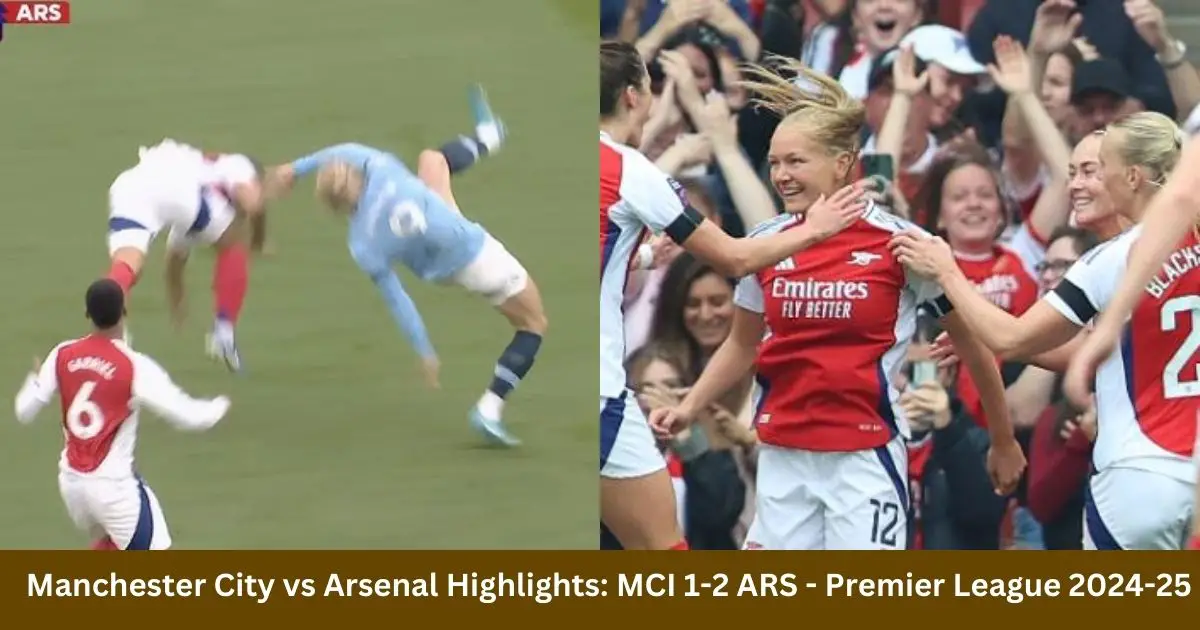The game, played on a brisk September afternoon, ended with a dramatic late equaliser from John Stones, securing a crucial point for City against a determined Arsenal side reduced to ten men. With the final score at 1-2, this match not only highlighted the competitive spirit of both teams but also set the stage for what promises to be an electrifying season in the Premier League.
First Half: A Tactical Battle
The first half commenced with both teams displaying their tactical nous. Arsenal, under the guidance of Mikel Arteta, aimed to control the midfield with their high pressing and quick transitions. Manchester City, led by Pep Guardiola, countered with their characteristic possession-based style, looking to dominate the ball and create chances through intricate passing.
Arsenal took an early lead in the 23rd minute, thanks to a stunning goal from their star striker, Gabriel Jesus. The Brazilian capitalised on a defensive lapse from City, latching onto a loose ball before unleashing a powerful shot that left Ederson with no chance. The away fans erupted as Arsenal took the lead, injecting confidence into their performance.
In response, City intensified their efforts, with Kevin De Bruyne and Phil Foden linking up effectively. De Bruyne’s vision and passing ability were pivotal in creating several scoring opportunities, but Arsenal’s defence, marshalled by the ever-reliable William Saliba, stood firm. Despite City’s dominance in possession, they struggled to break down Arsenal’s resolute backline, which was further bolstered by the outstanding performances of their midfielders.
A Turning Point: Red Card for Arsenal
The momentum shifted dramatically in the 39th minute when Arsenal’s Thomas Partey received a straight red card for a reckless challenge on Bernardo Silva. The decision was contentious, but after a brief VAR review, the referee upheld the call, leaving Arsenal with ten men for the remainder of the match. This pivotal moment not only changed the dynamics of the game but also put significant pressure on the Gunners to defend their lead.
Despite being a man down, Arsenal displayed remarkable resilience. Arteta reorganised his team, shifting to a more defensive formation while relying on quick counter-attacks. The likes of Bukayo Saka and Gabriel Martinelli remained threats on the break, causing concern for City’s backline.
Second Half: City’s Persistent Pressure
The second half began with Manchester City on the front foot, determined to exploit their numerical advantage. Guardiola’s men pressed forward, creating a flurry of chances. Erling Haaland, who had been relatively quiet in the first half, began to find space as Arsenal’s defence stretched thin.
City’s relentless pressure finally bore fruit in the 63rd minute when Haaland leveled the score. A beautifully crafted move saw De Bruyne deliver a pinpoint cross into the box. Haaland rose above the Arsenal defenders, connecting with a powerful header that beat Aaron Ramsdale and sent the home crowd into raptures.
With the score at 1-1, City continued to dominate possession, but Arsenal’s backline held strong. Ramsdale made several crucial saves, denying Haaland and Foden as they sought to capitalize on the momentum. The Gunners’ defensive unit, despite being a man short, showcased incredible organisation and determination, frustrating City’s attempts to find the winner.
Late Drama: Stones’ Equaliser
As the match entered its final stages, it seemed City would secure all three points. However, in the 88th minute, a dramatic twist unfolded. Following a sustained period of pressure, John Stones found himself in the right place at the right time. After a corner kick was poorly cleared by the Arsenal defence, Stones seized the opportunity, firing a powerful shot from the edge of the box that sailed past Ramsdale, sending the City faithful into a frenzy.
Post-Match Reactions
In the aftermath of the match, both managers expressed contrasting emotions. Pep Guardiola praised his team for their resilience and ability to keep pushing until the final whistle. “We showed great character today,” he stated. “To come back from behind against a strong side like Arsenal, especially after conceding an early goal, speaks volumes about our mentality.”
Mikel Arteta, on the other hand, lamented the missed opportunity. “We were excellent in the first half and showed our quality,” he reflected. “But the red card changed everything. I’m proud of the way the team fought back, but we must learn to manage situations better.” His disappointment was palpable, as the Gunners could have taken all three points despite the odds stacked against them.
Key Takeaways
Resilience of Arsenal: Despite being reduced to ten men, Arsenal’s defensive performance was commendable. Their ability to maintain structure and frustrate City’s attacking flow showcased their growth as a team under Arteta.
Tactical Adjustments: Both managers demonstrated their tactical acumen, adapting to the flow of the game. Arteta’s ability to reorganise his team following the red card was particularly impressive, while Guardiola’s faith in his squad’s attacking prowess paid off in the end.
Future Implications: This match has significant implications for both teams in the Premier League title race. City will view the point as a valuable addition to their tally, while Arsenal will need to regroup and build on their performance to maintain their competitiveness.
Conclusion
The clash between Manchester City and Arsenal was a microcosm of what the Premier League embodies: excitement, drama, and unpredictability. With the match ending 1-2 in favour of Arsenal, City’s late equaliser ensured that the points were shared, leaving fans on the edge of their seats until the final whistle. As the season progresses, both teams will take valuable lessons from this encounter, setting the stage for a thrilling campaign ahead. With more matches like this, the Premier League continues to live up to its reputation as one of the most exciting leagues in the world.

